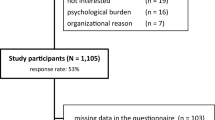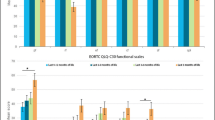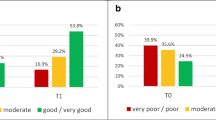Abstract
Purpose
The aim of this study was to assess the difference in explained variance of Health-Related Quality of Life (HRQoL) between comorbidity, sociodemographic characteristics and cancer characteristics. This association was assessed among thyroid cancer, colorectal cancer, and (non-)Hodgkin's lymphoma patients.
Methods
Data from three large population-based surveys on survivors of thyroid cancer, colorectal cancer, and (non-)Hodgkin's lymphoma were used. Cancer-specific HRQoL was assessed with the European Organization for Research and Treatment of Cancer (EORTC) Quality of Life Questionnaire Core 30 (QLQ-C30) of which physical function, emotional function, fatigue, and pain were included in the analyses. Comorbidity was assessed using the Self-reported Comorbidity Questionnaire. The association between comorbidity and HRQoL was assessed with multivariate linear regression models. Semi-partial R 2 was reported to assess the amount of variance in HRQoL explained by comorbidity in comparison with sociodemographic and cancer characteristics.
Results
In total, 3,792 cancer survivors were included in this analysis. The variance in HRQoL subscales explained by comorbidity was higher compared with sociodemographic and cancer characteristics for physical function (11–17 vs. 2–4 and 1–2 %, respectively) and emotional function (7–17 vs. 1–3 and 1–3 %, respectively), regardless of cancer type. In addition, comorbidity explained 7–20 and 11–13 % of the variance in pain and fatigue, respectively, compared to 0–4 % for both sociodemographic and cancer characteristics. Osteoarthritis and back pain were strongly associated with physical function and pain, while depression was strongly associated with emotional function. Depression and back pain were strongly associated with fatigue.
Conclusions
This study showed that comorbidity explained more variance in physical and emotional function, pain, and fatigue in comparison with sociodemographic and cancer characteristics in cancer survivors, regardless of cancer type. Our findings emphasize the importance of adjusting for the presence of comorbid diseases when assessing HRQoL in cancer survivors.
Implication for cancer survivors
Cancer survivors suffering from comorbid diseases experience lower levels of health-related quality of life. Clinicians should become more aware of the impact of comorbidity on HRQoL and provide necessary psychological support to assist self-management of comorbid diseases.




Similar content being viewed by others
References
WHO. Active ageing: a policy framework. Geneva: World Health Organization; 2002.
Coleman MP, Gatta G, Verdecchia A, et al. EUROCARE-3 summary: cancer survival in Europe at the end of the 20th century. Ann Oncol. 2003;14:v128–49.
Janssen-Heijnen MLG, Houterman S, Lemmens VEPP, et al. Prognostic impact of increasing age and co-morbidity in cancer patients: a population-based approach. Crit Rev Oncol Hematol. 2005;55:231–40.
Kaplan RM. Quality of life: an outcomes perspective. Arch Phys Med Rehabil. 2002;83:s44–50.
Gijsen R, Hoeymans N, Schellevis FG, et al. Causes and consequences of comorbidity: a review. J Clin Epidemiol. 2001;54:661–74.
Baumeister H, Balke K, Härter M. Psychiatric and somatic comorbidities are negatively associated with quality of life in physically ill patients. J Clin Epidemiol. 2005;58:1090–100.
El-Deiry MW, Futran ND, McDowell JA, et al. Influences and predictors of long-term quality of life in head and neck cancer survivors. Arch Otolaryngol Head Neck Surg. 2009;135:380–4.
Terrell JE, Ronis DL, Fowler KE, et al. Clinical predictors of quality of life in patients with head and neck cancer. Arch Otolaryngol Head Neck Surg. 2004;130:401–8.
Wahlgren T, Levitt S, Kowalski J, et al. Use of the Charlson combined comorbidity index to predict postradiotherapy quality of life for prostate cancer patients. Int J Radiat Oncol Biol Phys. 2011;81:997–1004.
Grønberg BH, Sundstrøm S, Kaasa S, et al. Influence of comorbidity on survival, toxicity and health-related quality of life in patients with advanced non-small-cell lung cancer receiving platinum-doublet chemotherapy. Eur J Cancer. 2010;46:2225–34.
Thong MSY, Mols F, Lemmens VEPP, et al. Impact of chemotherapy on health status and symptom burden of colon cancer survivors: a population-based study. Eur J Cancer. 2011;47:1798–807.
Thong MSY, Mols F, Lemmens VEPP, et al. Impact of preoperative radiotherapy on general and disease-specific health status of rectal cancer survivors: a population-based study. Int J Radiat Oncol Biol Phys. 2011;81:e49–58.
Parker PA, Baile WF, Moor C, Cohen L. Psychosocial and demographic predictors of quality of life in a large sample of cancer patients. Psychooncology. 2003;12:183–93.
Lehto U-S, Ojanen M, Kellokumpu-Lehtinen P. Predictors of quality of life in newly diagnosed melanoma and breast cancer patients. Ann Oncol. 2005;16:805–16.
Sangha O, Stucki G, Liang MH, et al. The self-administered comorbidity questionnaire: a new method to assess comorbidity for clinical and health services research. Arthritis Care Res. 2003;49:156–63.
Arndt V, Stegmaier C, Ziegler H, Brenner H. A population-based study of the impact of specific symptoms on quality of life in women with breast cancer 1 year after diagnosis. Cancer. 2006;107:2496–503.
Carreca I, Balducci L, Extermann M. Cancer in the older person. Cancer Treat Rev. 2005;31:380–402.
van de Poll-Franse LV, Horevoorts N, Eenbergen MV et al. The Patient Reported Outcomes Following Initial treatment and Long term Evaluation of Survivorship registry: scope, rationale and design of an infrastructure for the study of physical and psychosocial outcomes in cancer survivorship cohorts. Eur J Cancer. 2011;47:2188–94.
Coebergh JWW, Janssen-Heijnen MLG, Louwman WJ, Voogd AC. Cancer incidence and survival in the south of the Netherlands, 1955–1999 & incidence in the north of Belgium, 1996–1998 [CD-ROM]. Eindhoven: Comprehensive Cancer Centre South (IKZ); 2001.
Mols F, Denollet J, Kaptein AA, et al. The association between type D personality and illness perceptions in colorectal cancer survivors: a study from the population-based PROFILES registry. J Psychosom Res. 2012;73:232–9.
Mols F, Thong MSY, van de Poll-Franse LV, et al. Type D (distressed) personality is associated with poor quality of life and mental health among 3080 cancer survivors. J Affect Disord. 2012;136:26–34.
Husson O, Haak HR, Buffart LM, et al. Health-related quality of life and disease specific symptoms in long-term thyroid cancer survivors: a study from the population-based PROFILES registry. Acta Oncol. 2013;52:249–58.
Aaronson NK, Ahmedzai S, Bergman B, et al. The European Organization for Research and Treatment of Cancer QLQ-C30: a quality-of-life instrument for use in international clinical trials in oncology. J Natl Cancer Inst. 1993;85:365–76.
Hofman M, Ryan JL, Figueroa-Moseley CD, et al. Cancer-related fatigue: the scale of the problem. Oncologist. 2007;12:4–10.
Green CR, Hart-Johnson T, Loeffler DR. Cancer-related chronic pain. Cancer. 2011;117:1994–2003.
Oerlemans S, Mols F, Issa DE, et al. A high level of fatigue among (long-term) non-Hodgkin lymphoma survivors: results from the longitudinal population-based PROFILES registry in the south of the Netherlands. Haematologica. 2013;98(3):479–86. doi:10.3324/haematol.2012.064907.
Fayers PM, Aaronson NK, Bjordal K, Sullivan M. EORTC QLQ-C30 scoring manual. Brussels, Belgium. 1995;1:1–49.
Ludwig H, van Belle S, Barrett-Lee P, et al. The European Cancer Anaemia Survey (ECAS): a large, multinational, prospective survey defining the prevalence, incidence, and treatment of anaemia in cancer patients. Eur J Cancer. 2004;40:2293–306.
Kristjansson S, Wyller T. Introduction. In: Schrijvers D, Aapro M, Zakotnik B et al. (eds): ESMO handbook of cancer in the senior patient, 1st Edition. Switzerland: Informa; 2010.
Husson O, Haak HR, Mols F, et al. Development of a disease-specific health-related quality of life questionnaire (THYCA-QoL) for thyroid cancer survivors. Acta Oncol. 2013;52(2):447–54. doi:10.3109/0284186X.2012.718445.
Østhus A, Aarstad AH, Olofsson J, Aarstad H. Comorbidity is an independent predictor of health-related quality of life in a longitudinal cohort of head and neck cancer patients. Eur Arch Otorhinolaryngol. 2013;270:1721–8.
Kroenke C, Kwan M, Neugut A et al. Social networks, social support mechanisms, and quality of life after breast cancer diagnosis. Breast Cancer Res. Treat. 2013;1–13.
Sammarco A. Perceived social support, uncertainty, and quality of life of younger breast cancer survivors. Cancer Nurs. 2001;24:212–9.
Cohen HJ, Lan L, Archer L, Kornblith AB. Impact of age, comorbidity and symptoms on physical function in long-term breast cancer survivors (CALGB 70803). J Geriatr Onco. 2012;3:82–9.
Jensen RE, Arora NK, Bellizzi KM, et al. Health-related quality of life among survivors of aggressive non-Hodgkin lymphoma. Cancer. 2013;119(3):672–80. doi:10.1002/cncr.27781.
Oerlemans S, Mols F, Nijziel M, et al. The impact of treatment, socio-demographic and clinical characteristics on health-related quality of life among Hodgkin's and non-Hodgkin's lymphoma survivors: a systematic review. Ann Hematol. 2011;90:993–1004.
Baumeister H, Kriston L, Bengel J, Härter M. High agreement of self-report and physician-diagnosed somatic conditions yields limited bias in examining mental–physical comorbidity. J Clin Epidemiol. 2010;63:558–65.
Powell H, Lim LLY, Heller RF. Accuracy of administrative data to assess comorbidity in patients with heart disease: an Australian perspective. J Clin Epidemiol. 2001;54:687–93.
Chen RC, Royce TJ, Extermann M, Reeve BB. Impact of age and comorbidity on treatment and outcomes in elderly cancer patients. Semin Radiat Oncol. 2012;22:265–71.
Hancock SL, Cox RS, McDougall IR. Thyroid diseases after treatment of Hodgkin's disease. N Engl J Med. 1991;325:599–605.
Lee JJ, Swain SM. Peripheral neuropathy induced by microtubule-stabilizing agents. J Clin Oncol. 2006;24:1633–42.
Perez EA, Suman VJ, Davidson NE, et al. Cardiac safety analysis of doxorubicin and cyclophosphamide followed by paclitaxel with or without trastuzumab in the North Central Cancer Treatment Group N9831 adjuvant breast cancer trial. J Clin Oncol. 2008;26:1231–8.
Tan-Chiu E, Yothers G, Romond E, et al. Assessment of cardiac dysfunction in a randomized trial comparing doxorubicin and cyclophosphamide followed by paclitaxel, with or without trastuzumab as adjuvant therapy in node-positive, human epidermal growth factor receptor 2-overexpressing breast cancer: NSABP B-31. J Clin Oncol. 2005;23:7811–9.
Acknowledgments
We thank all the patients and their doctors for their participation in the study. Special thanks to Dr. M van Bommel for her availability as an independent advisor and willingness to answer patients' queries. In addition, we thank the following hospitals for their cooperation: Amphia Hospital (Breda), Bernhoven Hospital (Veghel and Oss), Catharina Hospital (Eindhoven), Elkerliek Hospital (Helmond), Jeroen Bosch Hospital ('s-Hertogenbosch), Maxima Medical Center (Eindhoven and Veldhoven), St Anna Hospital (Geldrop), St Elisabeth Hospital (Tilburg), Twee Steden Hospital (Tilburg and Waalwijk), and VieCuri Hospital (Venlo and Venray).
The present research is supported in part by a Social Psychology Fellowship from the Dutch Cancer Society to Melissa Thong (no. UVT2011-4960) and a Cancer Research Award from the Dutch Cancer Society (no. UVT-2009-4349) to Lonneke van de Poll-Franse. Data collection for this study was funded by the Comprehensive Cancer Center South, Eindhoven, The Netherlands; the Center of Research on Psychology in Somatic diseases (CoRPS), Tilburg University, The Netherlands; and an investment subsidy (no. 480-08-009) of The Netherlands Organization for Scientific Research (The Hague, The Netherlands). The funding sources were neither involved in the collection, interpretation, and analysis of the data, nor in the decision for the writing and submission of this report for publication.
Conflict of interest
The authors have declared no conflicts of interest.
Author information
Authors and Affiliations
Corresponding author
Rights and permissions
About this article
Cite this article
Vissers, P.A.J., Thong, M.S.Y., Pouwer, F. et al. The impact of comorbidity on Health-Related Quality of Life among cancer survivors: analyses of data from the PROFILES registry. J Cancer Surviv 7, 602–613 (2013). https://doi.org/10.1007/s11764-013-0299-1
Received:
Accepted:
Published:
Issue Date:
DOI: https://doi.org/10.1007/s11764-013-0299-1




